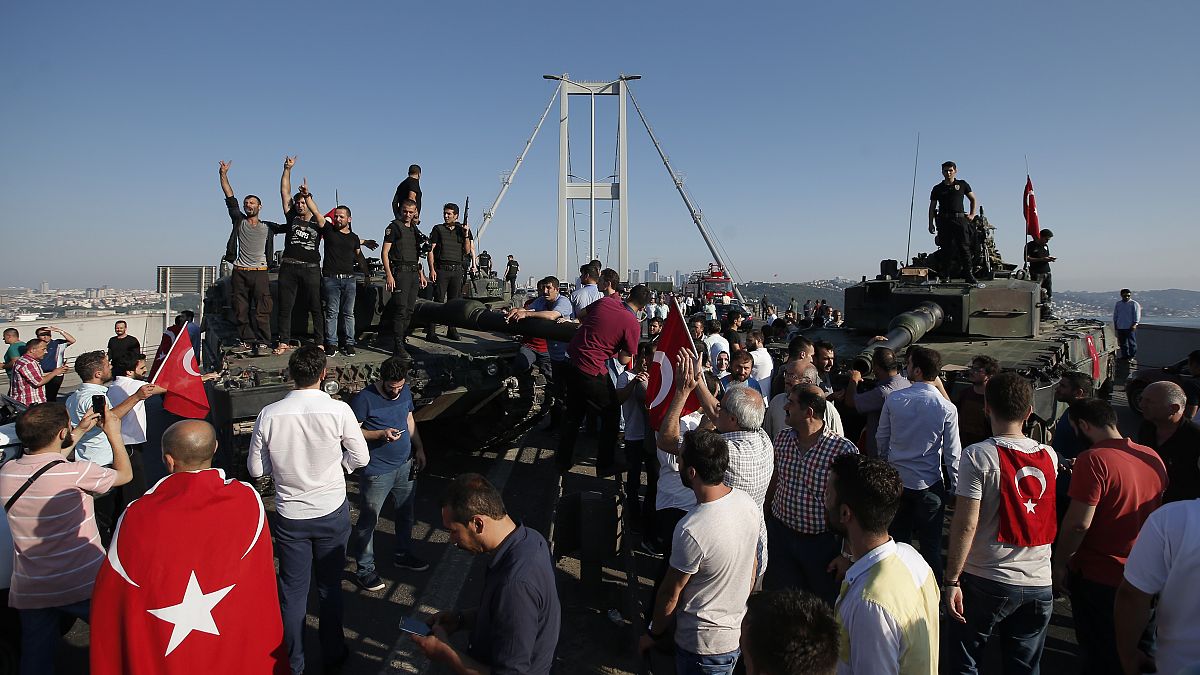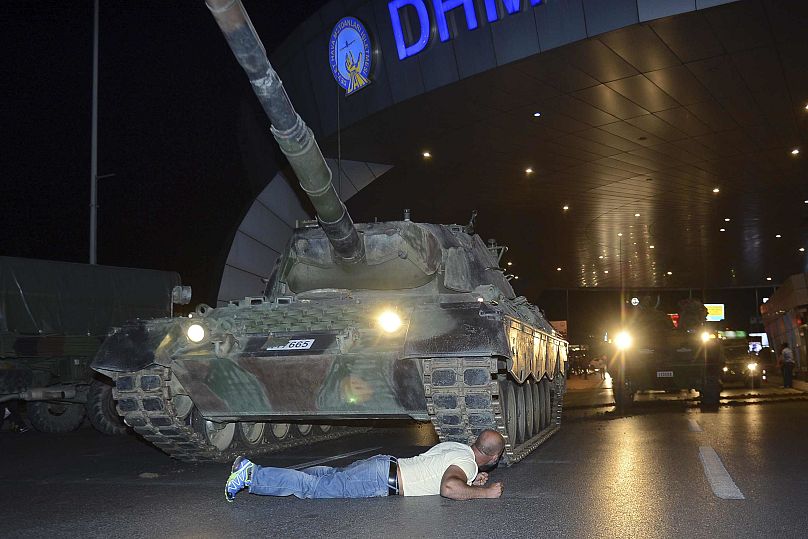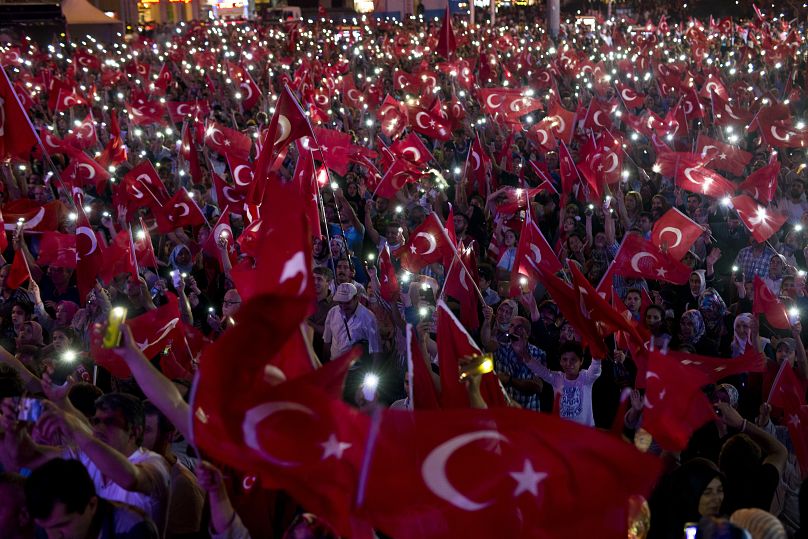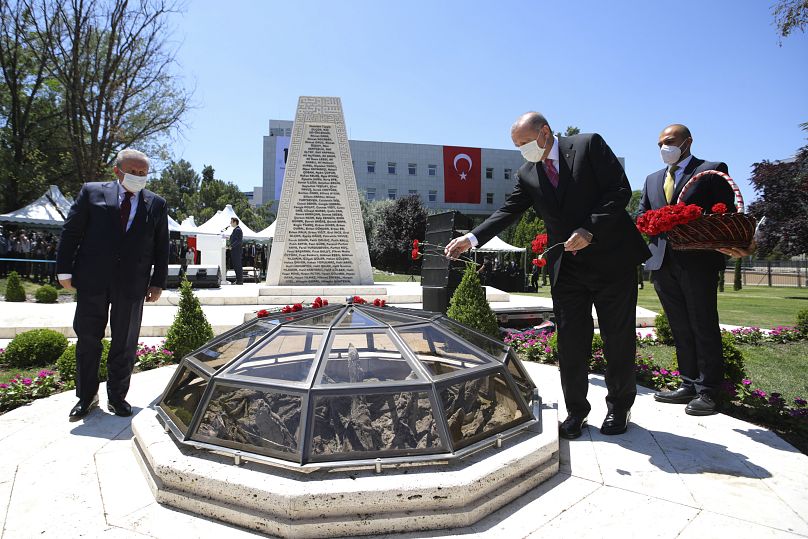Turkish President Recep Tayyip Erdoğan has hailed a 'victory for democracy' on the fifth anniversary of the attempted coup in 2016.
Turkish President Recep Tayyip Erdoğan has celebrated a "victory for democracy" on the fifth anniversary of an attempted coup.
On the night of 15 July 2016, a faction of the Turkish army attempted to overthrow the government, resulting in deadly clashes.
Military tanks were deployed in the streets while planes flew over Istanbul and Ankara, bombing parliament buildings and other strategic sites.
The putsch was halted after tens of thousands of Erdoğan's supporters, and loyal security forces, answered the President's call to help take down the coup plotters.
At least 251 people officially died during the night of violence, and more than 2,100 were injured.
A commemoration with relatives of victims is planned in the capital city, Ankara, on Thursday, alongside other events.
"July 15 is the victory of the people, of the national will, and of all those who believe in democracy," Erdoğan said at a ceremony in parliament to honour the victims.
The Turkish President also planned to inaugurate a "museum of democracy" to underline the historical importance of the event, which he says has "changed the destiny" of Turkey.
The celebrations may also provide an opportunity for Erdoğan to garner support as his popularity is eroding due to economic difficulties.
What happened in the attempted coup?
In the late evening on 15 July 2016, Turkish citizens were first alerted to military action when bridges over the Bosphorus in Istanbul were closed.
Shortly afterwards at 23:00 local time, the country's then-Prime Minister Binali Yildirim denounced an "illegal attempt" by a group within the army to seize power.
Turkey's armed forces then released a statement proclaiming "martial law" and a curfew, deploying troops across the nation's largest cities.
The statement was signed by a "Peace Council in the country", which said it had "taken control", flying fighter planes and helicopters at low altitudes over Ankara.
President Erdoğan was, at the time, on holiday in the west coast seaside resort of Marmaris, and was forced to address Turkey via a journalist's mobile phone.
"I absolutely do not think that these coup plotters will succeed," he said, urging citizens to "resist" the military minority and promising "a very strong response".
The subsequent deadly clashes were inevitable, as Erdoğan's supporters, many waving Turkish flags, braved the rebel army, climbing onto tanks deployed in the streets. In Istanbul, soldiers opened fire on the crowd, while explosions and gunfire could be heard in Ankara.
In the early hours of July 16, the Turkish President returned to Istanbul and denounced the coup as "treason," blaming his enemy -- preacher Fethullah Gülen -- of plotting the coup
Prime Minister Yildirim also ordered the army to shoot down planes and helicopters in rebel hands. Many senior military officials had publicly disassociated themselves from the coup plotters, calling on them to return to their barracks.
After dozens of soldiers surrendered, the Turkish government announced at midday that the attempted coup had failed and the situation was "entirely under control".
The announcement was met by celebration, as thousands of Turkish citizens celebrated in the cities' streets to a concert of car horns.
What has changed in Turkey since 2016?
Many analysts suggest that the failed coup has allowed Erdoğan to expand his presidential powers at the cost of a relentless crackdown.
Turkey has since seen widespread repression of Fethullah Gülen's alleged supporters, and the pro-Kurdish opposition.
Since 2016, more than 300,000 people have been arrested in the fight against Gülen's movement and nearly 3,000 sentenced to life imprisonment.
A further 100,000 people have also been dismissed from state institutions, including an estimated 23,000 military soldiers and 4,000 judges.
Moreover, Turkish secret services have carried out several operations in Central Asia, Africa and the Balkans to forcibly extradite alleged supporters of the coup plotters
Gülen has been living in the United States since 1999 and denies any involvement in the attempted putsch.
He had been a loyal ally of Erdoğan's ruling Justice and Development Party (AKP) until the two clashed in a power struggle in 2013.
Ankara has repeatedly requested his extradition from the U.S., without success, which has further deteriorated tensions between Turkey and Washington D.C.
Erdoğan has also consistently rejected EU criticism of the deterioration of the rule of law since the 2016 attempted coup, accusing Brussels of a "lack of empathy".
Meanwhile, many human rights NGOs accuse the Turkish administration of using the failed coup to strengthen their increasingly autocratic power.
It was five years ago, as the coup plotters surrendered, that Erdoğan tweeted to his supporters, asking them to continue being "masters of the streets" because, in his eyes, a new outbreak of violence is "always possible".



